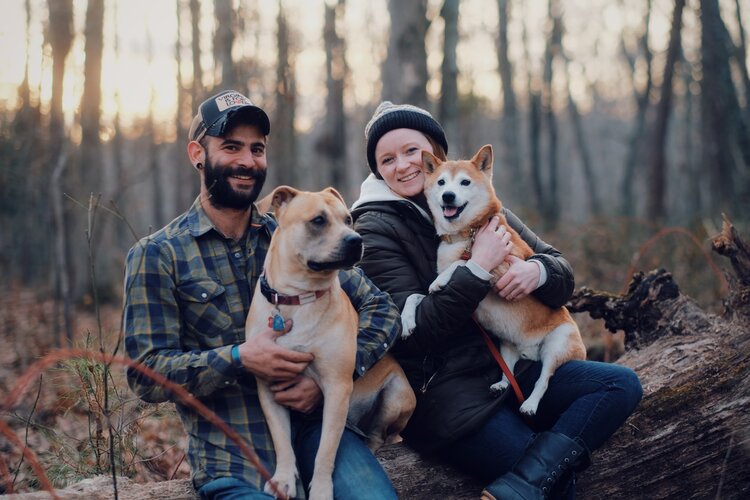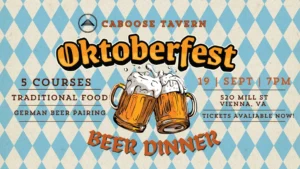One of our values at Caboose is sustainability, which consists of sourcing food locally, responsibly, and seasonally. Sustainability also includes minimizing waste and helping to improve our food cycle. At Caboose we upcycle spent grain from the brewing process in our crackers. Spent grain is the leftover malt and adjuncts after the mash has extracted most of the sugars, proteins, and nutrients. Aside from making the crackers, we also donate spent grain to local farmers to feed their livestock and even some local Vienna residents to feed their chickens. I personally take a few buckets home to feed my chickens, turkeys, and goats. They all love the grain.
Being a brewery, we are lucky to have excellently crafted products on hand at all times. We like to use our beer as much as possible in our recipes, either substituting wine for beer or using beer to help hydrate other dried ingredients. From condiments to desserts, there is so much creativity that can happen.
Our house-made beer mustard is made from mustard seeds soaked in our Citra Session or Fog IPA. The soaked seeds are then blended with brown sugar and vinegar to create a hearty mustard that is packed full of flavor.
We reduce the Fog IPA down to a syrup and add it to the house-made barbeque sauce. This helps bring a bittersweet element to our sauce that helps round out the flavor.
For long-cooked braises, we like to use our Brown Ale, Dutchess Porter, or Hobo Stout instead of wine, a standard ingredient in this type of recipe. Sauce for our chicken and rabbit dishes is sometimes started off with our Vienna VA Lager or Wasser Pilsner. You can even find beer in some of our desserts like the brownie.
While I was studying sustainability in culinary school, I began to dive deeper into the food system. Throughout my research and studies, I saw a lot of the inefficiencies in it. I have dedicated myself to helping, create, support, and/or nurture sustainable practices within each Caboose restaurant. Even at home, my wife and I (mostly her) have become more sustainable, all of our food scraps go to our animals and compost for our garden. Those studies verified my passion for food, when I get the food it is inherently dead, it’s my job to give it a second life, the food deserves this “second life” because it was grown in a beautiful and responsible manner. Some of the information I learned in my classes starts at home, from raising my own chickens and goats to growing my own herbs, vegetables, and fruits.
Sustainability isn’t limited to just fruits and vegetables. Wild game is also very important to our food cycle. Wild game is largely untouched by antibiotics and other additives, unlike some meats available at the grocery store, and requires fewer resources than traditional livestock. I have a soft spot for wild game or proteins that are hunted here in Virginia. In my experience beer pairs phenomenally with these game meats – the bitter, hoppy, and sweet brings a nice balance to the gamey flavors these meats typically have. I find that beer helps combat the lactic acid (which is what makes the meat gamey).
Historically Appalachian cuisine is very sustainable. It’s main focus is locally sourced food… Appalachian cuisine was “farm to fork” before it was cool. By focusing on local products at Caboose and presenting them through Appalachian cuisine, we create sustainable practices as a company. For more information on the history of the place and food, aside from my in-laws who live in Southwest VA, is a book called “Victuals” by Ronnie Lundi, which I highly recommend.
Caboose Tavern has already won the Snail of Approval from Slow Food DC, but that’s not enough. The award is amazing, but I want to go further. Local food sourcing, eco-friendly chemicals, living beds for microgreens and herbs, pickling and preserving ingredients in season – make it real and actionable. As we tackle our water usage, and look at equipment efficiencies within both Caboose restaurants and our brewery we continue to come up with creative ideas on how to tackle being more sustainable, less wasteful, and more efficient.
We want our customers and community to know what they are eating, where it comes from, and how they can make it last. We want people to eat the “ugly” vegetables and know they are still just as delicious. We hope that we can introduce people to wild game and find that they enjoy it. We hope to bring more events like our pickling class to teach some old ways of preserving foods and pass those sustainable practices along to our community and the next generation.
Caboose’s Spent Grain Crackers
Ingredients:
5 ½ Cup – All-Purpose Flour
1 Cup – Spent Grain
2 Cup – Beer (IPA)
1 Tablespoon – Kosher Salt
¼ Cup – Fennel Seed, Toasted
¼ Cup – Caraway Seed, Toasted
Flour on the counter to keep dough from sticking
Sea salt to top before baking
Preparation:
- Toast fennel and caraway in a dry skillet on medium heat until spices become aromatic (about 3 minutes).
- Combine flour, grain, spices, and salt in a mixer with a dough hook.
- Once thoroughly mixed, slowly add beer.
- Once beer is fully incorporated, roll dough into a ball and allow to rest for 35-40 minutes.
- Roll dough out in sheets using a pasta roller (Kitchen Aid setting 6) and place on the cooking sheet.
- Top crackers with sea salt and bake at 350F for 15-20 minutes.


